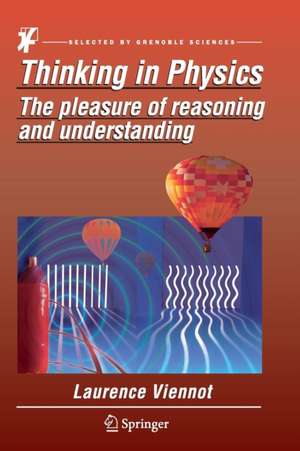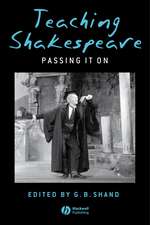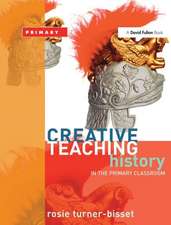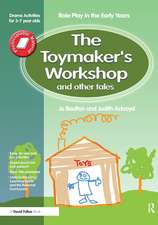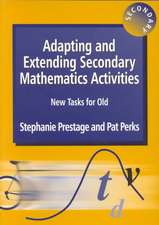Thinking in Physics: The pleasure of reasoning and understanding
Autor Laurence Viennoten Limba Engleză Paperback – 23 aug 2016
The book has three parts:
• making sense of special scientific ways of reasoning (words, images, functions)
• making connections between very different topics, each illuminating the other
• simplifying, looking for consistency and avoiding incoherent over-simplification
The book is enhanced with supplementary online materials that will allow readers to further expand their teaching or research interests and think about them more deeply.
| Toate formatele și edițiile | Preț | Express |
|---|---|---|
| Paperback (1) | 635.01 lei 6-8 săpt. | |
| SPRINGER NETHERLANDS – 23 aug 2016 | 635.01 lei 6-8 săpt. | |
| Hardback (1) | 642.51 lei 6-8 săpt. | |
| SPRINGER NETHERLANDS – apr 2014 | 642.51 lei 6-8 săpt. |
Preț: 635.01 lei
Preț vechi: 747.06 lei
-15% Nou
Puncte Express: 953
Preț estimativ în valută:
121.53€ • 126.40$ • 100.33£
121.53€ • 126.40$ • 100.33£
Carte tipărită la comandă
Livrare economică 14-28 aprilie
Preluare comenzi: 021 569.72.76
Specificații
ISBN-13: 9789402402018
ISBN-10: 9402402012
Pagini: 184
Ilustrații: XIX, 161 p. 58 illus., 5 illus. in color.
Dimensiuni: 155 x 235 x 10 mm
Greutate: 0.27 kg
Ediția:Softcover reprint of the original 1st ed. 2014
Editura: SPRINGER NETHERLANDS
Colecția Springer
Locul publicării:Dordrecht, Netherlands
ISBN-10: 9402402012
Pagini: 184
Ilustrații: XIX, 161 p. 58 illus., 5 illus. in color.
Dimensiuni: 155 x 235 x 10 mm
Greutate: 0.27 kg
Ediția:Softcover reprint of the original 1st ed. 2014
Editura: SPRINGER NETHERLANDS
Colecția Springer
Locul publicării:Dordrecht, Netherlands
Cuprins
Foreword.- Foreword to the French Edition.- Preface.- Part I Learning to think: words, images and functions.- 1 Essential tools for comprehension.- 2 Some surprising invariances.- 3 Analysis of functional dependence: a powerful tool.- 4 Putting things into practice.- Part II Physics: linking factors.- 5 Links between phenomena in terms of type of functional dependence.- 6 The relationship between different approaches to the same phenomenon.- Part III Simplicity: ruin or triumph of coherence?.- 7 Optimising simple experiments.- 8 Popularising physics: what place for reasoning?.- 9 Conclusion.- Appendix A - What this book owes to physics education research.- Appendix B - The weight of air and molecular impacts: how do they relate?.- Appendix C –Causal linear reasoning.- Appendix D - When physics should conform to beliefs: pierced bottles.- Appendix E – Reactions of trainee journalists and scientific writers confronted with inconsistency.- Appendix F – “Facilitating elements" of communication: Year 11 students ranking the risks of misunderstanding.
Notă biografică
Laurence Viennot is emeritus professor at the Université Denis Diderot (Paris 7) and contributed to the creation of the LDPES (Laboratoire de Didactique de la Physique dans l'Enseignement Supérieur) laboratory, now part of the Laboratoire André Revuz. She has for a long time been responsible for the Master's course in science teaching, but devotes herself equally to training physics instructors. Her books and publications are recognised worldwide as sources of reference (Teaching Physics, Enquête sur le concept de causalité, etc.).
Previous books:
VIENNOT L. 1979. Le raisonnement spontané en dynamique élémentaire. Paris : Hermann.
VIENNOT L. 1996. Raisonner en physique: la part du sens commun. Avec la contribution de A. Benséghir, H. Caldas, F.Chauvet, J.L. Closset, W. Kaminski, L. Maurines, J. Menigaux, S. Rainson, S. Rozier, E. Saltiel, Bruxelles: De Boeck.
VIENNOT L. 2002. Razonar en fisica. La contribucion del sentido comun. Trad: M.J. Pozo Municio. Madrid: Ant Machado libros (Visor Distribuciones).
VIENNOT L. 2001. Reasoning in Physics The part of common sense, Trad. A. Moisy. Dordrecht: Kluwer Ac. Pub.
VIENNOT L. 2002. Enseigner la Physique. Avec la collaboration de U.Besson, F. Chauvet, P. Colin, C. Hirn-Chaine, W. Kaminski, S. Rainson. Bruxelles: De Boeck.
VIENNOT L. 2003. Teaching physics. With the collaboration of U. Besson, F. Chauvet, P. Colin, C. Hirn-Chaine, W. Kaminski, S. Rainson. Trad. M. Greenwood & A. Moisy. Dordrecht: Kluwer Ac. Pub.
VIENNOT L. & DEBRU C. (Eds.) 2003. Enquête sur le concept de causalité. Paris: PUF.
VIENNOT L (Dir.) 2009. Didactique, épistémologie et histoire des sciences – Penser l’enseignement. Collection Sciences, histoire et société, Paris : PUF.
VIENNOT, L. 2011. En physique, pour comprendre . Collection Grenoble Sciences. Paris : EDP Sciences.
Previous books:
VIENNOT L. 1979. Le raisonnement spontané en dynamique élémentaire. Paris : Hermann.
VIENNOT L. 1996. Raisonner en physique: la part du sens commun. Avec la contribution de A. Benséghir, H. Caldas, F.Chauvet, J.L. Closset, W. Kaminski, L. Maurines, J. Menigaux, S. Rainson, S. Rozier, E. Saltiel, Bruxelles: De Boeck.
VIENNOT L. 2002. Razonar en fisica. La contribucion del sentido comun. Trad: M.J. Pozo Municio. Madrid: Ant Machado libros (Visor Distribuciones).
VIENNOT L. 2001. Reasoning in Physics The part of common sense, Trad. A. Moisy. Dordrecht: Kluwer Ac. Pub.
VIENNOT L. 2002. Enseigner la Physique. Avec la collaboration de U.Besson, F. Chauvet, P. Colin, C. Hirn-Chaine, W. Kaminski, S. Rainson. Bruxelles: De Boeck.
VIENNOT L. 2003. Teaching physics. With the collaboration of U. Besson, F. Chauvet, P. Colin, C. Hirn-Chaine, W. Kaminski, S. Rainson. Trad. M. Greenwood & A. Moisy. Dordrecht: Kluwer Ac. Pub.
VIENNOT L. & DEBRU C. (Eds.) 2003. Enquête sur le concept de causalité. Paris: PUF.
VIENNOT L (Dir.) 2009. Didactique, épistémologie et histoire des sciences – Penser l’enseignement. Collection Sciences, histoire et société, Paris : PUF.
VIENNOT, L. 2011. En physique, pour comprendre . Collection Grenoble Sciences. Paris : EDP Sciences.
Textul de pe ultima copertă
Read this book if you want to know how to give students the intellectual pleasure of understanding physics. Read it even if you fear that this goal is out of reach – you may be surprised! Laurence Viennot shows ways to deal with the awkward fact that common sense thinking is often not the same as scientific thinking. She exposes frequent and widespread errors and misunderstandings, which provide a real eye-opener for the teacher. More than that, she shows ways to avoid and overcome them. The book argues against over-emphasis on “fun” applications, demonstrating that students also enjoy and value clear thinking.
The book has three parts:
• Making sense of special scientific ways of reasoning (words, images, functions)
• Making connections between very different topics, each illuminating the other
• Simplifying, looking for consistency, and avoiding incoherent over-simplification
It offers a magnificent supply of insight and ideas, all of which can be put to use no matter what physics programme you teach. The examples provided in this book shed light on the processes of teaching and popularization of physics, from the high school to the early undergraduate level.
"I recommend this book to all my colleagues engaged in teaching physics and other scientific disciplines, but also to students, future teachers and all those who take pleasure in understanding"
Guy Aubert
Emeritus Professor, Université Joseph Fourier, grenoble, France
The book has three parts:
• Making sense of special scientific ways of reasoning (words, images, functions)
• Making connections between very different topics, each illuminating the other
• Simplifying, looking for consistency, and avoiding incoherent over-simplification
It offers a magnificent supply of insight and ideas, all of which can be put to use no matter what physics programme you teach. The examples provided in this book shed light on the processes of teaching and popularization of physics, from the high school to the early undergraduate level.
"I recommend this book to all my colleagues engaged in teaching physics and other scientific disciplines, but also to students, future teachers and all those who take pleasure in understanding"
Guy Aubert
Emeritus Professor, Université Joseph Fourier, grenoble, France
Caracteristici
Offers practical examples of appropriate teaching practices Emphasizes the value of the process of reasoning Exposes many of the distorted or false interpretations common in much current physics teaching Includes a Foreword by Guy Aubert, former CNRS Director General Enriched with illustrations, a comprehensive bibliography and online supplementary materials Includes supplementary material: sn.pub/extras
